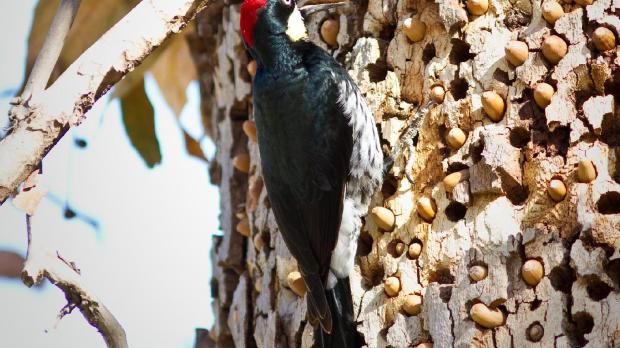Botanists call it a mast year when an oak tree suddenly produces exponentially more seeds than its norm. They don’t know what it is that precipitates this. And it’s not just one or two oaks that mast one year—it’s all the oaks, for thousands of miles. Whatever the trigger is, it sets off a cascade of plenty, and it is, as my eccentric and elegant Latin teacher used to say, with a gleam in her eye, “mirabile visu—a wonder to behold!”
The term “mast year” comes from the Old English. Medieval farmers called the accumulated piles and piles of acorns mæst, and since this was what they fed their livestock, it made a year that otherwise would have been a struggle an easy, bountiful year,one of feasting and abundance. Since the tree masted, not only the livestock but even the wild animals would have more than enough to eat. There would be so much seed that even when every creature on the food chain was satisfied, there would still be a carpet of acorns left underfoot to take root.
I came across this term in my reading, and immediately remembered the 12 wicker baskets full of the leftover bread and fish. I remembered the disciples whose net was so full they could hardly handle the weight. I thought of the 3,000 newly baptized following Pentecost. And from the Old Testament, I remembered the prophecy of the trickle of water flowing out of the temple that becomes so great that when it empties itself into the “polluted waters of the sea,” it “freshens them” (Ezekiel 47:8).
This mirabile visu … we’re living it.
Our age is mankind’s great Mast Year. Grace lies like acorns on the forest floor. Here in this present time, since God became man—how can we look around and say that the world is wretched and evil, moving steadily down the fast track to hell?
Yes, our culture is a culture of death, and everything from relativism to totalitarianism is sweeping the globe. We are inundated with stories of sickness, selfishness, and brutality from all sides. Yet these things are not the whole story.
We who had only the law before now have the Spirit. We who had only manna now see and touch and eat the actual Body of Jesus. We who were slaves are now the children of God, and more than that, even, for we are the bride of Christ as well, and more even than that—we are the Body of Christ. We are led by the Holy Spirit, and given the treasury of the merit of the saints and the seven sacraments of the Church. We are told simply “Ask and you will receive” and “Do not be afraid any longer, little flock, for the Father is pleased to give you the Kingdom of Heaven.”
The first words of Adam, fallen from grace, were, “I heard you in the garden, but I was afraid.” This fear that we have inherited from Adam is still with us. But the angels who announce Christ’s birth cry out, “Do not be afraid!” After the Resurrection, Christ says over and over again, “Peace be with you” and “Take heart! I have overcome the world!” His parting words give us everything we really need to know: “I am with you always, to the end of the age.”
So if you find you are afraid, sure that the world our children will grow up in will be too evil to bear, don’t forget the greater and the truer reality: these millennia since Christ’s resurrection are mankind’s great Mast Year, a time of plentiful grace, and of outpouring nourishment.

